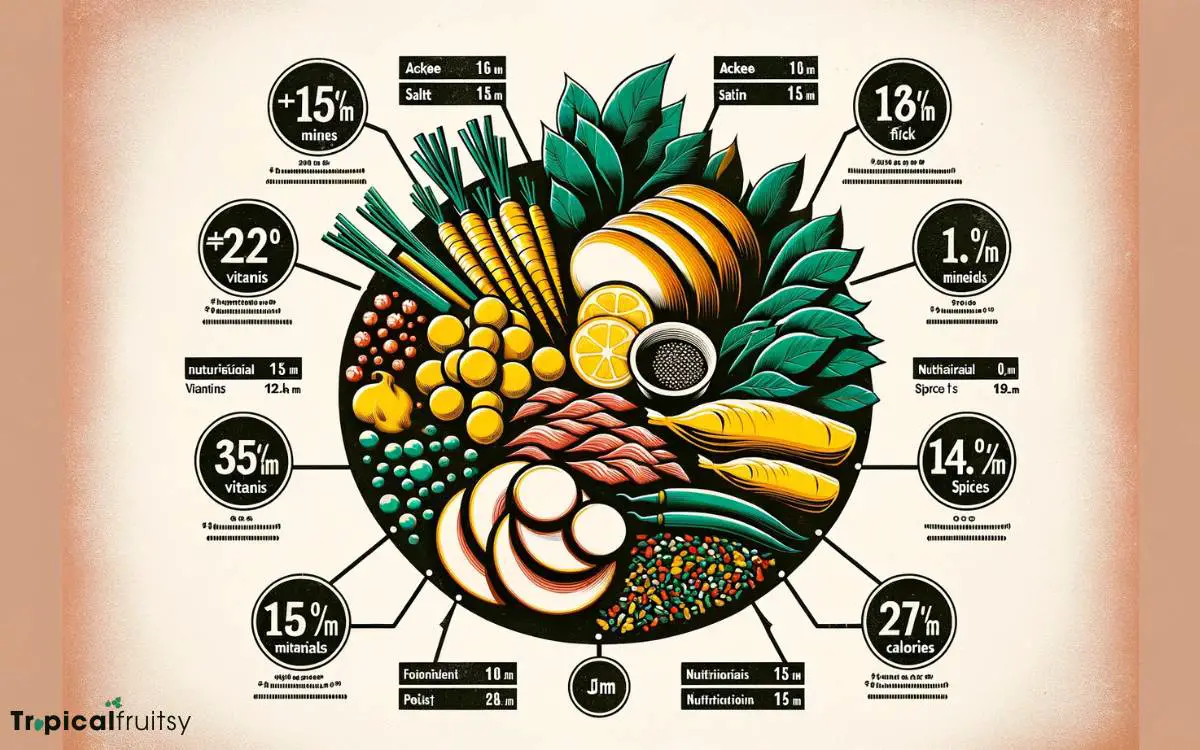Is Ackee and Saltfish Healthy? A Nutritional Guide!
Ackee and saltfish, a traditional Jamaican dish, has garnered international recognition for its unique flavor and cultural significance.
This culinary pairing combines the buttery texture of ackee, a tropical fruit, with the robust flavor of salted codfish. As with any dietary choice, assessing the health implications is critical for informed consumption.
This analysis will delve into the nutritional composition of ackee and saltfish, exploring its vitamins, minerals, and macronutrient balance.
Subsequently, we will examine the associated health benefits, such as its protein content and potential contribution to a balanced diet.
Conversely, attention must also be given to the potential health risks, including sodium content and preparation methods.
Our objective is to provide a comprehensive perspective on whether ackee and saltfish can be integrated into a health-conscious dietary regimen, and how to optimize its preparation for nutritional advantage.

Key Takeaway
Understanding Ackee and Saltfish

The composition of ackee and saltfish, a traditional Jamaican dish, combines the rich nutrients of ackee fruit with the preserved, salty flavor of dried and salted cod.
Ackee, when prepared correctly, is a source of essential fatty acids, fiber, and vitamins, particularly Vitamin A, zinc, and protein, contributing to a balanced diet.
Saltfish, on the other hand, is high in protein and offers a certain mineral density, but its high sodium content raises dietary considerations, particularly for individuals with hypertension.
It’s important to note that ackee must be consumed when fully ripe and prepared properly to avoid toxicity.
This dish reflects a cultural synthesis of nutrition and taste, prompting a deeper analysis of its health implications.
Nutritional Breakdown

Analyzing the nutritional content of ackee and saltfish reveals a substantial quantity of vitamins, minerals, and proteins essential for a balanced diet.
Ackee, the national fruit of Jamaica, contributes to this dish’s high vitamin C content, which is crucial for immune system support, and also provides dietary fiber, known for aiding digestion.
Saltfish, typically cod, offers a high-quality protein source and is rich in omega-3 fatty acids, beneficial for heart health.
- Vitamin C in ackee bolsters the immune system, sparking a feeling of empowerment against illnesses.
- Dietary fiber from ackee supports digestive health, leading to a sense of comfort and well-being.
- Omega-3 fatty acids in saltfish promote heart health, inspiring confidence in one’s dietary choices.
This dish, when consumed in moderation and prepared with minimal added fats, can be a nutritious addition to a diverse diet.
Health Benefits Explored

Beyond its rich nutritional profile, ackee and saltfish offers specific health advantages, such as improving cardiovascular function and enhancing metabolic health.
Ackee is high in unsaturated fatty acids, which are known to support heart health by maintaining healthy cholesterol levels. This can reduce the risk of heart disease.
Additionally, the fiber present in ackee aids in digestion and can help regulate blood sugar levels, contributing to better metabolic outcomes.
Saltfish, being a good source of protein, supports muscle maintenance and repair. It is also rich in essential vitamins and minerals, including iodine and selenium, which are critical for thyroid function and immune response.
However, it’s important to consume saltfish in moderation due to its high sodium content, which could negate some health benefits if overconsumed.
Potential Health Risks

Despite the nutritional benefits of ackee and saltfish, potential health risks must be considered, particularly due to ackee’s toxicity when unripe and saltfish’s high sodium content.
Ackee contains hypoglycin A, a toxin that can lead to severe health implications if consumed before it’s fully ripe and naturally opens. Consumption of unripe ackee may trigger ‘Jamaican Vomiting Sickness,’ which can be fatal.
Furthermore, saltfish, being preserved with salt, carries a high sodium level which, if ingested in large amounts, can contribute to health issues such as hypertension and heart disease.
Excessive salt intake from saltfish is linked to increased blood pressure and potential cardiovascular complications.
In addition to these risks, some individuals may experience adverse reactions to fish or specific compounds within ackee due to allergies or sensitivities.
What Are the Nutritional Benefits of Ackee and Saltfish?
Discover the delicious secrets of ackee and saltfish. This traditional Jamaican dish is not only flavorful but also packed with nutritional benefits. Ackee is a good source of vitamin C, potassium, and fiber, while saltfish provides protein and omega-3 fatty acids. Enjoy a satisfying and healthy meal with ackee and saltfish.
Making Healthier Choices

Although potential health risks associated with ackee and saltfish exist, making informed choices and adjustments can enhance the dish’s nutritional profile and reduce adverse health impacts.
By selecting lower-sodium saltfish, increasing the proportion of vegetables, or substituting traditional cooking fats with healthier oils, individuals can enjoy this traditional dish with an improved nutritional balance.
It is essential to consider both the macro and micronutrient content of the meal to ensure it aligns with a balanced diet.
| Healthier Choice | Benefit |
|---|---|
| Lower-sodium saltfish | Reduces risk of hypertension |
| Increase vegetables | Adds fiber and essential vitamins |
| Use unsaturated oils | Improves heart health |
| Serve with whole grains | Increases dietary fiber intake |
| Limit portion size | Helps maintain healthy weight |
Adopting these modifications can mitigate health concerns while allowing the enjoyment of ackee and saltfish as part of a diverse and nutritious diet.
Conclusion
Ackee and saltfish, a traditional Jamaican dish, presents a juxtaposition of healthful nutrients and potential risks. Diligence in preparation and moderation in consumption is essential.
As the adage goes, ‘too much of a good thing can be harmful,’ which applies to the sodium content in saltfish.
A balanced diet incorporating this dish can contribute to overall health, provided that individuals are mindful of the sodium and cholesterol levels intrinsic to the ingredients.






